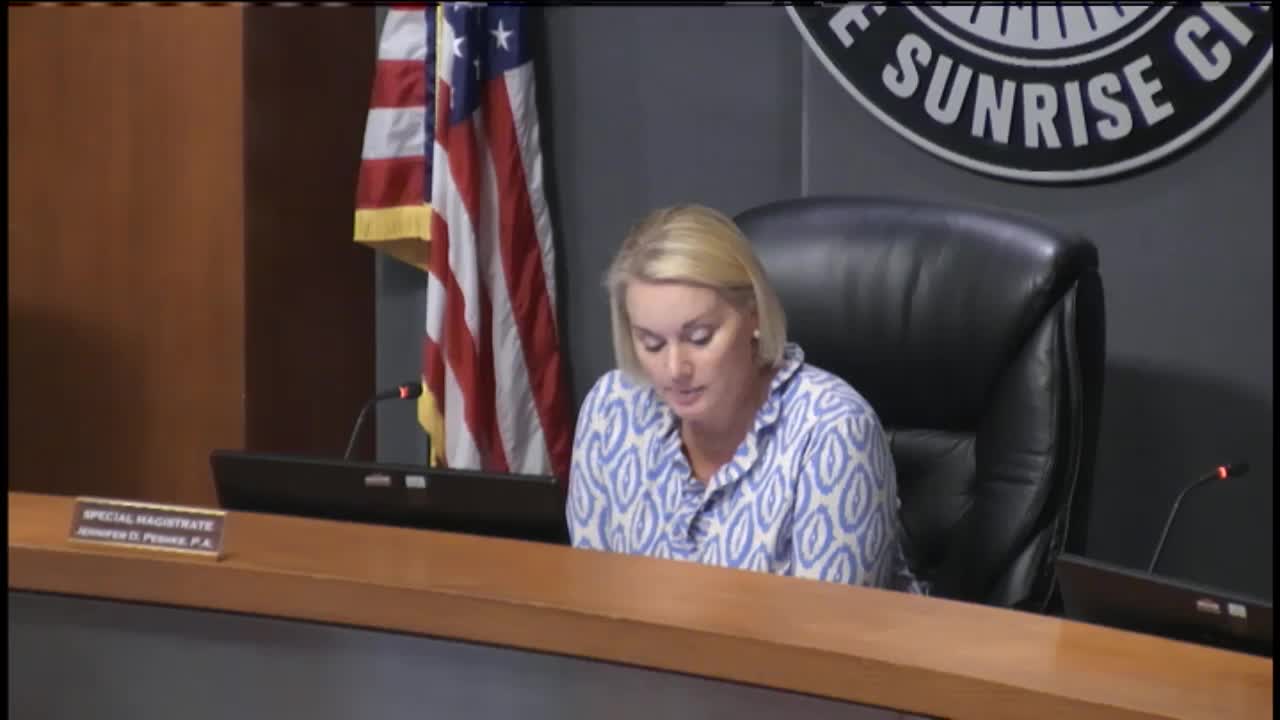Fort Pierce Special Magistrate Rules on Multiple Nuisance Violations in Code Enforcement Hearing
October 01, 2025 | Fort Pierce, St. Lucie County, Florida
This article was created by AI summarizing key points discussed. AI makes mistakes, so for full details and context, please refer to the video of the full meeting. Please report any errors so we can fix them. Report an error »

On October 1, 2025, the Special Magistrate Hearing in Fort Pierce, St. Lucie County, focused on addressing various code enforcement violations, particularly concerning nonoperable vehicles and landscaping nuisances. Special Magistrate Jennifer D. Peschke led the proceedings, which were attended by city officials, including assistant city attorney Felicia Holloman and code enforcement officers.
The hearing began with an overview of the process, emphasizing the importance of respectful conduct and the rights of respondents to present their cases. The city presented evidence for several cases, primarily involving nonoperable vehicles and landscaping violations that posed threats to public health and safety.
One notable case involved a property at 118 Maple Avenue, owned by Yolanda Emery, where a nonoperable vehicle had been reported. Code enforcement officer Heather De Bevec testified that despite previous communications with the owner, no action had been taken to rectify the situation. The magistrate ruled that the vehicle constituted a nuisance and ordered its removal within seven days, with a 30-day window for appeal.
Another case at 1407 South 27th Street, owned by William Petit, followed a similar pattern. Officer Charmaine Kirkland confirmed that Petit had been informed of the violation, yet compliance had not been achieved. The magistrate again ruled in favor of the city, mandating the vehicle's removal and allowing for an appeal.
The hearing also addressed landscaping violations at multiple properties, including 617 North Ninth Street and 614 North Ninth Street. In these cases, the city found that the properties did not meet landscaping requirements, which could lead to fines of $100 per day for noncompliance. The magistrate ordered property owners to address these issues within seven days, with the costs of abatement to be assessed against the properties.
Overall, the hearing underscored the city's commitment to maintaining community standards and public safety through proactive code enforcement. The decisions made during this session reflect ongoing efforts to address nuisances effectively, ensuring that property owners are held accountable while providing them with opportunities to appeal and rectify violations. The next steps will involve monitoring compliance with the orders issued and addressing any further violations that may arise.
The hearing began with an overview of the process, emphasizing the importance of respectful conduct and the rights of respondents to present their cases. The city presented evidence for several cases, primarily involving nonoperable vehicles and landscaping violations that posed threats to public health and safety.
One notable case involved a property at 118 Maple Avenue, owned by Yolanda Emery, where a nonoperable vehicle had been reported. Code enforcement officer Heather De Bevec testified that despite previous communications with the owner, no action had been taken to rectify the situation. The magistrate ruled that the vehicle constituted a nuisance and ordered its removal within seven days, with a 30-day window for appeal.
Another case at 1407 South 27th Street, owned by William Petit, followed a similar pattern. Officer Charmaine Kirkland confirmed that Petit had been informed of the violation, yet compliance had not been achieved. The magistrate again ruled in favor of the city, mandating the vehicle's removal and allowing for an appeal.
The hearing also addressed landscaping violations at multiple properties, including 617 North Ninth Street and 614 North Ninth Street. In these cases, the city found that the properties did not meet landscaping requirements, which could lead to fines of $100 per day for noncompliance. The magistrate ordered property owners to address these issues within seven days, with the costs of abatement to be assessed against the properties.
Overall, the hearing underscored the city's commitment to maintaining community standards and public safety through proactive code enforcement. The decisions made during this session reflect ongoing efforts to address nuisances effectively, ensuring that property owners are held accountable while providing them with opportunities to appeal and rectify violations. The next steps will involve monitoring compliance with the orders issued and addressing any further violations that may arise.
View full meeting
This article is based on a recent meeting—watch the full video and explore the complete transcript for deeper insights into the discussion.
View full meeting